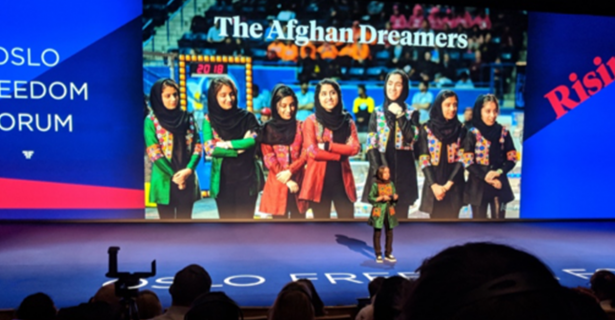There are very few events in the world that will land you in as many places as I found myself during the course of the Oslo Freedom Forum, especially in so little time.
Over the course of my three days, I found myself in a Norwegian theatre, in an ancient Norwegian fort, in the Nobel Peace Prize Museum, in some of the most beautiful restaurants in the country, and finally in another theatre, somehow more breathtaking than the first.
There are also very few events around the world that will allow you to connect with so many extraordinary people in such a concentrated area. Everywhere I turned, I found myself talking to someone that has changed the world in one way or another.
Over dinner with the other Oslo scholars, I had a conversation with Nasako Besingi who happened to be sitting next to me. He is an environmental activist that dedicated his life to making sure that private companies within Cameroon would not exploit the rainforest for their corporate benefit. In this conversation, he emphasized one important life lesson; “Companies talk to each other on an international scale. Countries make treaties and negotiate on an international scale. If we want the world to focus on individual human rights, people and communities have to start talking to each other on an international scale to be able to compete”.
That night, I decided to go out with a few members and speakers at the Forum. I decided to walk with a writer and activist for sexual education in Uganda named Jerry Sesanga. One of the last things he told me before we parted was that everyone could be an activist, if only they acknowledge a problem in their community and work to fix it. Working to fix a small problem can make a big difference in the world.
It might be obvious to some, but at that point, I realized something that took me pretty much the entire conference to understand; when one goes to these types of conferences, it is important to sit in rooms and listen to speeches, but the real connections and the real knowledge is gained outside the walls of the formal conference. It’s gained in lunches, conversations and simple hangouts with the people that have the knowledge and expertise you seek. If you go outside your comfort zone and work to create links with the people you meet, the conference gains a whole new level of importance, and it will certainly be something to remember for a lot more than just a few months.
I noticed on the last day that I was coincidentally rooming with a forum participant and we decided to take a little bit of time outside of the conference to go up to the roof of the hotel. We talked about what we had learned during the conference and just took in the breathtaking view of the city. He told me his incredible life story, we traded business cards, and ultimately parted ways.
It might not seem like a particularly impressive experience, but at the time it was truly incredible. I formed a bond with a man that I had just met due to our love for human rights and activism. That’s really what the conference is all about, feeling like you are part of a “family” on a professional scale, something which I will definitely use in the future.

